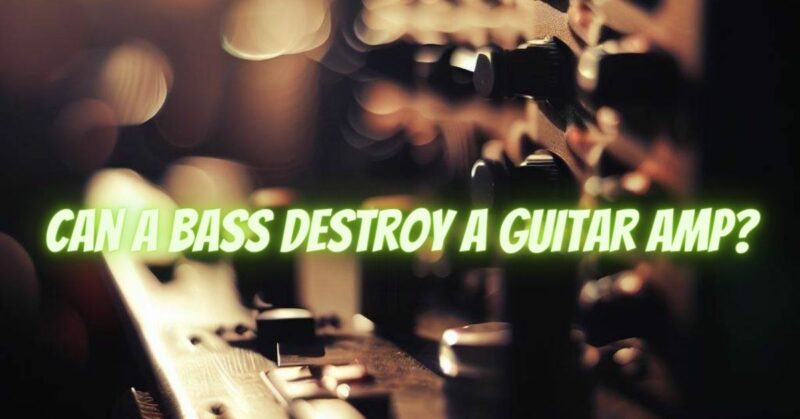Mixing and matching musical equipment can be an exciting endeavor, but it’s crucial to understand the compatibility and potential risks involved. One common concern among musicians is whether using a bass guitar with a guitar amp can cause damage to the amp. While it’s generally not recommended to use a bass guitar with a guitar amp, there are specific factors to consider to ensure the safety of your equipment. In this article, we will explore the potential risks and precautions when using a bass guitar with a guitar amp, helping you make informed decisions about your gear setup.
- Frequency Response and Speaker Capacity:
The primary concern when using a bass guitar with a guitar amp is the frequency response and speaker capacity. Bass guitars produce lower frequencies compared to standard guitars, requiring an amp and speaker system capable of handling the lower-end power. Guitar amps are designed with a narrower frequency range, typically tailored to the mid-range and higher frequencies of a guitar. The lower frequencies produced by a bass guitar can put excessive strain on the amp’s speakers, potentially leading to damage.
- Power Handling and Wattage:
Bass guitars also require more power to reproduce their lower frequencies effectively. Guitar amps are generally lower in wattage compared to bass amps since guitarists typically rely on smaller venues or use sound reinforcement systems. Using a bass guitar with a guitar amp can overload the amp’s power section, pushing it beyond its intended capabilities. This can result in distortion, overheating, or even damage to the amp’s circuitry.
- Speaker Cone Movement and Distortion:
The bass frequencies produced by a bass guitar can cause significant cone movement in a guitar amp’s speakers. Guitar speakers are typically designed for the faster transients and mid-range frequencies of guitars, and the excessive cone movement induced by bass notes can cause speaker distortion and physical damage. It’s important to note that distortion in a guitar amp is desirable for guitar tones but can lead to speaker damage when handling bass frequencies.
- Impact on Tube Amplifiers:
Tube amplifiers, known for their warm and responsive tones, require careful consideration when used with a bass guitar. Bass frequencies place higher stress on the power tubes, potentially causing premature wear or tube failure. Additionally, the increased power demands of a bass guitar can strain the amp’s transformers, capacitors, and other components, compromising their longevity.
- Precautions and Solutions:
To avoid potential damage when using a bass guitar with a guitar amp, consider the following precautions:
a. Use a dedicated bass amp: Investing in a dedicated bass amplifier designed to handle the low frequencies and power requirements of a bass guitar is the safest option.
b. Use a bass preamp or pedal: If you still want to use a guitar amp, consider using a dedicated bass preamp or pedal between the bass guitar and the amp. These devices can help tailor the frequency response and protect the amp from excessive low frequencies.
c. Limit volume and low-frequency content: When using a bass guitar with a guitar amp, be mindful of volume levels and avoid pushing the amp to its limits. Reducing the low-frequency content using EQ settings or a high-pass filter can also help protect the speakers.
Conclusion:
While using a bass guitar with a guitar amp may seem like a convenient option, it poses risks to the amp’s speakers, circuitry, and overall performance. It’s advisable to use a dedicated bass amplifier or employ precautions such as using a bass preamp or limiting low-frequency content when using a guitar amp. By understanding the potential risks and taking necessary precautions, you can enjoy your bass guitar without jeopardizing your guitar amp’s integrity.


